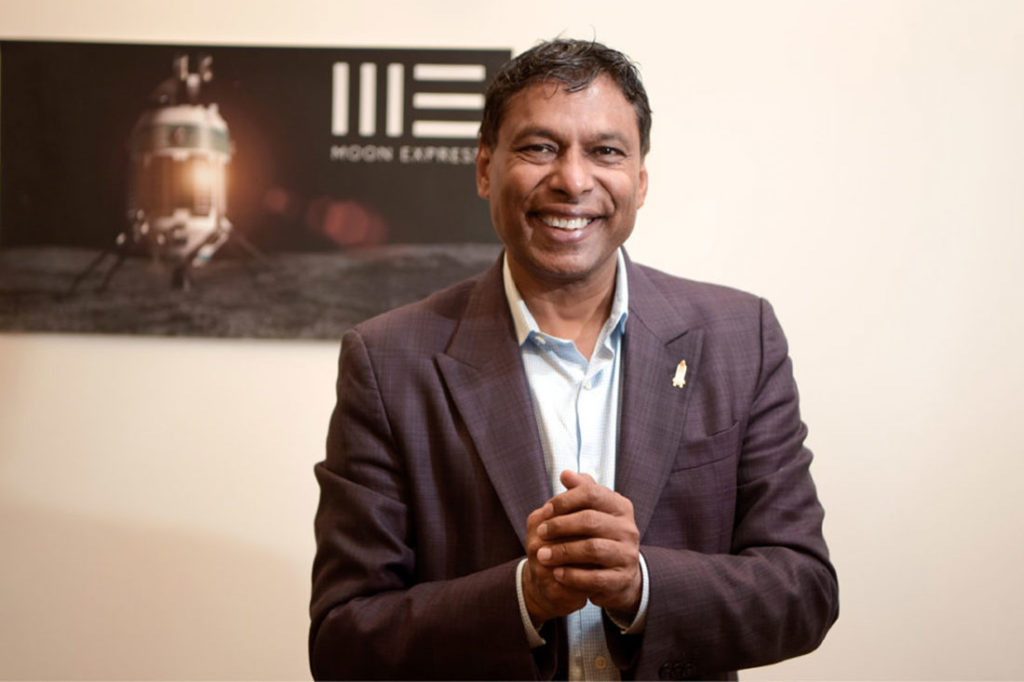Naveen Jain is crazy.
That’s not an insult, that’s exactly how Jain describes himself. “If people don’t think you’re crazy, then you’re not thinking big,” he wrote in his book Moonshots: Creating a World of Abundance, released late last year.
And when Jain says “people” he’s not necessarily referring to people on social media or a general public he may never meet. In his case, those “people” are his own family members.
“When my family first heard about the idea of mining the moon, we were all like ‘What?’ ” says Jain’s youngest son Neil.
That’s right, mining the freaking moon.
Naveen told the family, which, in addition to 22-year-old Neil, consists of wife Anu and their two older children, 29-year-old Ankur and 25-year-old Priyanka, that he planned to start a company that would land a rover on the moon and begin the process of mining for helium-3, which Jain believes will ultimately solve the all of Earth’s energy concerns.
Wild as the idea may have seemed, the Jains knew to take Naveen seriously about the company he was forming, Moon Express. And, after the initial shock wore off, they knew he could be just the man to pull off such an astonishing feat.
Jain’s entire life has been structured around a specific mindset that allows him to dream big. But it’s not just about dreaming big, it’s about actually working to accomplish these seemingly impossible feats. A serial entrepreneur, he thinks in terms of abundance. As he says in Moonshots, “Once you change your mindset from one of scarcity to a mindset of abundance, you begin to think of potentials and possibilities rather than the things that can’t be done.”
Not satisfied with just one dramatic goal, Jain has another startup with a seemingly impossible vision. His company Viome has a very simple aim: to make illness optional.
“I believe it’s easier to solve a large problem than to solve a small problem,” Jain says.
I believe it’s easier to solve a large problem than to solve a small problem.
You’re probably not a tech billionaire. You’re probably not planning to land a moon rover in 2020, and you’re probably not trying to change the entire healthcare system. If you’re like most people, you’re more likely worried about your next sale or getting your kids to school on time.
But Jain insists his mindset applies in all areas of life. His life experiences confirm the benefits of the attitude
of abundance.
True Scarcity
“I did not realize that my mother was actually illiterate,” says Jain, reflecting back on his childhood in and around New Delhi, India.
The Jain family was very poor, but his mother and father worked hard to make sure that their son was educated. It is from this background that Jain developed strong intellectual curiosity, which is evident just in the incredible disparity in the companies that Jain has started and the many hats he’s worn throughout his career.
Jain worked hard to get into the Indian Institutes of Technology—among that country’s most prestigious schools—where he earned a degree in engineering. Better still, he says, he achieved greater confidence in himself.
But he wasn’t satisfied: He wanted to prove himself in America. So he moved to the United States in the 1980s and eventually found his way to Microsoft. He married his wife, Anu, and started their family. Anu is a highly accomplished individual in her own right, holding an MBA from Rutgers. She worked alongside Naveen for years at his first startup, all while raising their three children.
The immigrant success story is a familiar one, especially in the tech and startup world. The current CEOs of Google and Microsoft (Sundar Pichai and Satya Nadella, respectively) are both fellow Indian immigrants. Sergey Brin, one of the founders of Google, was born in Russia. Perhaps the person Jain is most similar to in his world-changing ideas, though, is another immigrant, South African-born Elon Musk.
All of these men, whether they’d articulate it in exactly the same way that Jain does, share the abundance mindset. It allowed them to dream about moving to America to do bold things and has given them the ability to succeed in unimaginable ways.
“Oftentimes people who are immigrants are the most resilient, tough, ambitious people,” says Jain’s daughter Priyanka. “To be successful in almost any job, the most important trait you can have is resilience, and I think that is why you see so many successful immigrants. They grew up training their muscle of resilience every single day.”
So: resilience, toughness, ambition. All good qualities for anyone to have. But not everyone with those qualities takes moonshots quite like Jain. But maybe they aren’t as crazy as they initially sound.
Aim High
In 2010, when Jain first proposed the idea for Moon Express, a private company landing on the moon seemed extremely far-fetched. But with the rise of other space companies, like Musk’s SpaceX, the chance of actually getting a lunar lander to the moon becomes less remote.
And as Jain explains in Moonshots, the technology becomes significantly cheaper each year.
He believes that the rocket that will deliver the first Moon Express lander will cost under $5 million. In the past, a private company could never dream of spending the billions and billions of dollars that NASA has spent on space exploration, but now those companies are running more efficiently. Moon Express is one of nine firms that will be assisting NASA on its own mission to return to the moon.
 And that hits on one of Jain’s key theories about the future. In his opinion, no longer will nation-states be the only superpowers capable of achieving incredible human feats. Jain envisions a world in which entrepreneurs and their companies are the new superpowers. Their ability to adapt and achieve major goals quickly without having to pander to voters or fight through the machinations of bureaucracy gives them a clear advantage over nation-states, according to Jain.
And that hits on one of Jain’s key theories about the future. In his opinion, no longer will nation-states be the only superpowers capable of achieving incredible human feats. Jain envisions a world in which entrepreneurs and their companies are the new superpowers. Their ability to adapt and achieve major goals quickly without having to pander to voters or fight through the machinations of bureaucracy gives them a clear advantage over nation-states, according to Jain.
“It doesn’t matter how small you are, you are actually closer to disrupting the industry leaders than being disrupted,” Jain says.
The ability to disrupt an industry is something that Jain thrives on. He firmly rejects the idea that legacy knowledge is more valuable than an outsider’s opinion. He says that if you are in an industry for too long, you are no longer innovating, most likely, and you have a chance of being disrupted.
“So, that means the more the mature the company is, the bigger the chance they really have of becoming obsolete,” Jain says. “That means every single time, if you are starting out, you’re closer to being a success.”
This is why Jain has companies in fields he has no experience in himself. He believes in his, and his team’s, ability to penetrate the space industry as well as the healthcare field.
The abundance mindset doesn’t allow him to think small.
Viome is the perfect example of Jain’s disruptive mindset. He believes that the healthcare landscape is ordered in the wrong way—patients go see doctors when they are sick and doctors treat the symptoms with medicines that can have harmful side effects. Viome believes that by tracking a customer’s vital signs, specifically their gut health, and supplying them with the proper treatments before a condition worsens, they can eliminate illnesses before symptoms even arise.
Jain puts it in revolutionary terms: What if illness were elective?
The abundance mindset doesn’t allow him to think small.
Even If You Miss
It’s a cliché classroom poster: “Shoot for the moon. Even if you miss, you’ll land among the stars.”
The saying, credited to several sources including the Power of Positive Thinking author Norman Vincent Peale, is, of course, technically inaccurate. But it’s quite inspiring if you work for Moon Express. Jain believes that entrepreneurs never fail; they just pivot.
His life hasn’t been a never-ending string of successes. His first company, InfoSpace, was at one time valued over $31 billion during the Dot Com Bubble of the late 1990s, according to a 2005 Seattle Timesarticle. But, like many tech companies in that era, it collapsed. Jain and his fellow executives became mired in lawsuits.
Jain says many of the issues with InfoSpace came down to inexperience.
“I was a victim of being a first-time entrepreneur. I wasn’t paying attention to the minor details,” he says.
His oldest son Ankur (named to the SUCCESS30 Under 30 in this issue for his own accomplishments) grew up going to board meetings at InfoSpace and was often at the office with his dad as a youngster. He remembers the difficulty of the post-crash days, but credits his father’s impressive ability to think positively with his quick rebound.
“A lot of people can get beaten down by stuff like that,” Ankur says. “He didn’t spend time complaining or self-loathing. He just focused on the next steps. That is a powerful mindset.”
 ©Mark Perlstein
©Mark Perlstein
Success or Something Close
Perhaps that’s the unstated through line of all of Naveen Jain’s ventures. Yes, he wants to land on the moon and successfully mine it for the helium-3 gas that he believes will eliminate the need for the energy resources we fight wars over here on Earth. Being the guy who ends war while also making illnesses optional would be a pretty nice way to be remembered.
But perhaps falling short wouldn’t be the worst thing. Failure for Moon Express could mean that it becomes one of the few private companies capable of landing on the moon and still benefits mankind in the future. Failure for Viome might still mean making the world a bit healthier—and doesn’t every little bit count in that regard? These are noble goals in their own right, but only made possible by the initial goal being so far-fetched that “settling” is still world-changing.
Jain, at age 59 and worth billions, could have retired to the golf course a long time ago. But there’s nothing crazy, audacious and world-changing about lowering your handicap.
He sums it up this way: “Why would you want to waste your life on chasing a small ball on a golf course, when you could be chasing the moon?”
The moon has a long association with people perceived to be crazy. Our English word lunatic comes from the Latin lunaticus, referring to the moon, as Romans believed it caused madness.
Only time will tell if Jain is remembered as a lunatic or a lunar legend, but for now he isn’t worried. He doesn’t determine his success by the amount of money he’s made or the acclaim he’s earned. Instead, it’s all about the problems he’s solved and the things he’s created and the next steps.
Related: Think Slow and Other Tricks for Better Problem-Solving
This article originally appeared in the Fall 2019 issue of SUCCESS magazine.










